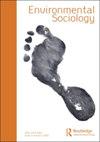‘The revolution’s never done’: the role of ‘radical imagination’ within anti-capitalist environmental justice activism
IF 2.8
Q3 ENVIRONMENTAL STUDIES
引用次数: 2
Abstract
ABSTRACT Many individuals become involved in activism due to concerns about contemporary structural conditions and likely (negative) futures arising from them. While negative perceptions are important for driving initial involvement, visions of positive alternative futures to work towards can be crucial for motivating and shaping activist engagement. Positive visions serve as a goal as well as a potential blueprint to inform practices such that the ‘means match the ends.’ In this paper, we explore Khasnabish and Haiven’s concept of the ‘radical imagination’ as a practice in sustaining and shaping social movement engagement through a shared vision of an alternative future. We emphasise the processes of organising and grounding action in practices of the present, which forms part of a ‘praxis of prefiguration’ – informing many aspects of community building and activism. While the radical imagination shared by anti-capitalist activists is sometimes depicted as a utopian dream, we suggest that it is, rather, a hopeful imagining in constant conversation with ideological positions and organising practices, situated against and within the margins of capitalist society. These ideological commitments and future imaginings shape the ways that anti-capitalists engage with overlapping environmental and social issues and the wider landscape of political action.“革命从未结束”:“激进想象”在反资本主义环境正义行动主义中的作用
许多人由于对当代结构状况及其可能产生的(负面)未来的担忧而参与行动主义。虽然消极的看法对推动最初的参与很重要,但对积极的未来的愿景对于激励和塑造积极分子的参与至关重要。积极的愿景既是一个目标,也是一个潜在的蓝图,为实践提供信息,使“手段”与“结果”相匹配。在本文中,我们探讨了Khasnabish和haven的“激进想象”概念,将其作为一种实践,通过对替代未来的共同愿景来维持和塑造社会运动的参与。我们强调在当前实践中组织和基础行动的过程,这构成了“预构实践”的一部分-为社区建设和行动主义的许多方面提供信息。虽然反资本主义激进分子分享的激进想象有时被描绘成乌托邦式的梦想,但我们认为,这是一种充满希望的想象,与意识形态立场和组织实践不断对话,处于资本主义社会的边缘。这些意识形态的承诺和对未来的想象塑造了反资本主义参与重叠的环境和社会问题以及更广泛的政治行动的方式。
本文章由计算机程序翻译,如有差异,请以英文原文为准。
求助全文
约1分钟内获得全文
求助全文
来源期刊

Environmental Sociology
ENVIRONMENTAL STUDIES-
CiteScore
4.60
自引率
12.00%
发文量
34
期刊介绍:
Environmental Sociology is dedicated to applying and advancing the sociological imagination in relation to a wide variety of environmental challenges, controversies and issues, at every level from the global to local, from ‘world culture’ to diverse local perspectives. As an international, peer-reviewed scholarly journal, Environmental Sociology aims to stretch the conceptual and theoretical boundaries of both environmental and mainstream sociology, to highlight the relevance of sociological research for environmental policy and management, to disseminate the results of sociological research, and to engage in productive dialogue and debate with other disciplines in the social, natural and ecological sciences. Contributions may utilize a variety of theoretical orientations including, but not restricted to: critical theory, cultural sociology, ecofeminism, ecological modernization, environmental justice, organizational sociology, political ecology, political economy, post-colonial studies, risk theory, social psychology, science and technology studies, globalization, world-systems analysis, and so on. Cross- and transdisciplinary contributions are welcome where they demonstrate a novel attempt to understand social-ecological relationships in a manner that engages with the core concerns of sociology in social relationships, institutions, practices and processes. All methodological approaches in the environmental social sciences – qualitative, quantitative, integrative, spatial, policy analysis, etc. – are welcomed. Environmental Sociology welcomes high-quality submissions from scholars around the world.
 求助内容:
求助内容: 应助结果提醒方式:
应助结果提醒方式:


